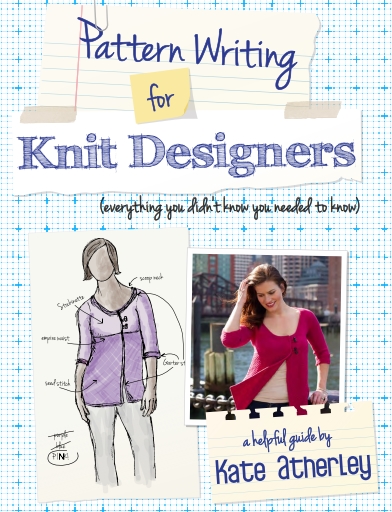 I get a lot of emails. Some deal with my own work, but a surprising amount of messages comes from people wanting to write patterns. Maybe my epic Twitter rants about poorly written patterns are to blame; maybe it is because when I teach I go on about things like gauge and chart symbols. Who knows?
What do you do if you didn't fluke a background in technical writing? Up to now you had to rely upon your knowledge of others' pattern writing skills and try to imitate their way of writing instructions. I understand why people do this, but it does not allow for reflection upon your own style and you may fall into adopting other people's bad habits without realising there are other options. Or you asked people like me who does have a background in technical writing (and who is horrifically busy) or you ask in Ravelry fora with somewhat mixed results.
I get a lot of emails. Some deal with my own work, but a surprising amount of messages comes from people wanting to write patterns. Maybe my epic Twitter rants about poorly written patterns are to blame; maybe it is because when I teach I go on about things like gauge and chart symbols. Who knows?
What do you do if you didn't fluke a background in technical writing? Up to now you had to rely upon your knowledge of others' pattern writing skills and try to imitate their way of writing instructions. I understand why people do this, but it does not allow for reflection upon your own style and you may fall into adopting other people's bad habits without realising there are other options. Or you asked people like me who does have a background in technical writing (and who is horrifically busy) or you ask in Ravelry fora with somewhat mixed results.
Anyway, it's been really frustrating for me that I have had nowhere to send all these lovely people. There are some great pattern design books in the world (like Maggie Righetti's Sweater Design in Plain English) but no pattern writing books out there. With Kate Atherley's book, Pattern Writing for Knit Designers, that drought is now at an end. It is not a knitting book filled with patterns; it is a book telling designers how to write patterns that are clear, concise and easy to follow. Kate Atherley is one of the most highly regarded technical editors in the business and her wealth of experience shows.
The book is a master-class in how to think about pattern writing. She discusses everything from how to structure a pattern (and provides a pattern template), which abbreviations to use, how to think about communicating cables and deciding upon formatting to why a designer's relationship with their technical editor is so important, working with and defining style sheets, how to self-publish, how to work with publications (and what they expect of you as a designer) and how to making easy-to-follow charts. It is an incredibly comprehensive book.

Kate's voice is authoritative, but never condescending. She assumes the reader is clever, resourceful and able to think for themselves. Look at the excerpt above: the three examples of a repeat within a row have an identical outcome (in terms of how many stitches you have at the end) but Kate goes through the examples one by one, and lets the reader work out why some formats are more effective than others.
And she makes you think about how writing patterns means communicating to someone who is not you. I find this is a pitfall for many designers who assume knitters work in the same way as themselves and find it hard to write for others. Writing for an audience is a real skill - and writing technical instructions for others to follow is even harder. I really like the way Kate makes you consider your audience before you begin writing.

In short, this book is a marvel. It is a technical and dry in places (which I obviously love), but after a dense paragraph about the taxonomy of cable stitches, Kate shows why you need to wrap your head about how to classify and name cable stitches - and she does so in a wonderfully down-to-earth manner. More importantly, she makes sure you will enjoy writing that cabled hat pattern of yours. Most importantly, Kate makes sure that your cabled hat pattern will make an enjoyable knit for knitters who will talk about your well-written pattern to others and keep coming back for more. Huzzah!
I should point out (in the name of full disclosure) that I am cited in the book and that I was asked to read an early draft of this book, but that does not alter my praise of this book. Whether you are an aspiring designer or an experienced designer/tech editor, this book will instruct and help you. I keep a copy next to me on my desk as it comes in handy on a daily basis. The book is full of great advice from other designers and technical editors - and has a great deal of links to useful resources. As Kate says, the book won't help you come up with designs but it will teach you how to write great patterns people will want to make again and again.
And happy knitters make for a happy knitting world.
You can buy the book here and it costs CAD$25. A real bargain for what you'll learn.
